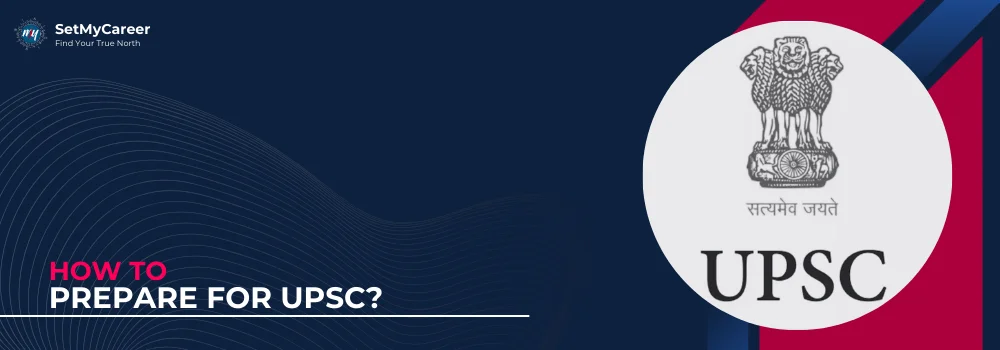Published by Jyothi Patil on 1 April 2025
Content Strategist | Editorial Team Member
Jyothi Patil is a skilled writer with a strong background in English literature, which she applies to crafting engaging content across various platforms. From writing blogs for her website and guest posts to creating pieces on Medium and Substack, Jyothi excels in making complex ideas easy to understand.
Your ultimate guide to acing the UPSC civil services examination.

Every year, lakhs of aspirants dream of clearing the UPSC Civil Services Examination, but only a handful succeed. What sets them apart? Smart preparation, discipline, and the right strategies. From time management for students to mastering stress, UPSC demands more than just hard work. This guide breaks down effective preparation strategies, the best time to study, and how to crack the final interview with confidence. Let's dive in!
Cracking the UPSC exam requires more than just hard work—it demands smart strategies, discipline, and a focused approach. Here are some expert-backed tips to help you with your preparation journey efficiently.
Understand the UPSC Syllabus Inside Out
The UPSC syllabus is vast, but understanding it thoroughly helps you prioritize topics. The Prelims focus on general studies and aptitude, while the Mains require in-depth knowledge of various subjects. Knowing what to study saves time and effort.
Create a Realistic Study Plan
UPSC preparation isn’t a sprint; it’s a marathon. Design a timetable that includes daily, weekly, and monthly goals. The best time to study varies from person to person, but early mornings and late nights are usually less distracting.
Master Time Management for Success
One of the biggest challenges is time management for students. Use the Pomodoro Technique—study for 50 minutes, take a 10-minute break, and repeat. Prioritize subjects based on weightage and difficulty level.
Make Notes & Revise Regularly
UPSC preparation is all about multiple revisions. Keep concise notes for quick reference. Writing down concepts in your own words helps with better retention.
Stay Updated with Current Affairs
Read newspapers like The Hindu or The Indian Express daily. Follow government websites, Rajya Sabha TV, and monthly current affairs magazines. Try writing short essays on trending topics.
Practice Answer Writing
For Mains, practice answer writing daily. Structure your answers using the Introduction-Body-Conclusion format. Add relevant data, quotes, and real-world examples to make them impactful.
Attempt Mock Tests & PYQs
Mock tests help identify weak areas and improve speed and accuracy. Solve Previous Year Question Papers (PYQs) to understand the exam pattern and question trends.
Manage Stress & Stay Motivated
Preparing for UPSC is mentally exhausting. To manage stress, take regular breaks, engage in hobbies, and exercise. Meditation and mindfulness can also help maintain focus.
Learn How to Focus While Studying
Distractions can derail preparation. So let's learn how to increase concentration while studying to improve concentration study in a quiet space, avoid social media, and use productivity apps like Forest or Notion. Set daily study targets and reward yourself after achieving them.
Stay Physically & Mentally Fit
A healthy body leads to a sharp mind. Exercise daily, eat nutritious food, and maintain a proper sleep schedule. Avoid burnout by maintaining a balanced study-life routine.

Clearing the written exams is just one part of the UPSC journey—the real test of personality begins with the interview. It’s where your confidence, knowledge, and presence of mind are evaluated. Here’s how you can ace the final stage of UPSC with the right preparation.
Develop a Strong Personality
The UPSC interview tests is not just about knowledge but also about personality, confidence, and communication skills. Work on your posture, speech clarity, and overall demeanor.
Know Your DAF Inside Out
Your Detailed Application Form (DAF) is the foundation of your interview. Expect questions on your background, education, hobbies, and work experience.
Stay Updated on Current Issues
Interviewers expect well-informed opinions on national and international affairs. Read newspapers, follow government policies, and develop a balanced perspective.
Improve Communication Skills
Practice mock interviews, record yourself, and refine your speaking style. Confidence and clarity in articulation matter more than complex vocabulary.
Develop a Calm & Composed Mindset
Unexpected questions can throw candidates off balance. Stay calm, take a moment to think, and structure your answers logically.
Preparing for UPSC requires dedication, consistency, and the right strategy. Whether it's managing time, reducing stress, or refining interview skills, a structured approach can make all the difference. If you need expert guidance, SetMyCareer is here to guide you along your career goals.
No. 14/595, 1st Floor, Nanjappa Reddy Layout, Koramangala 8th Block, Bangalore 560095